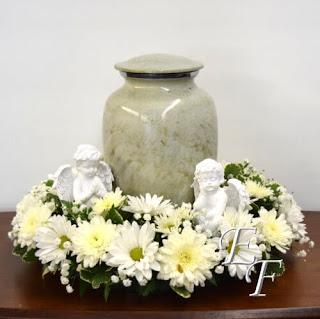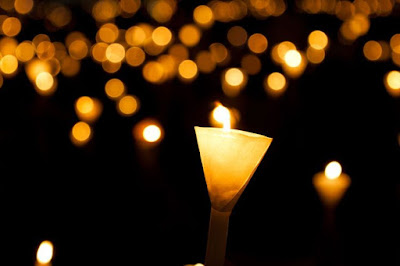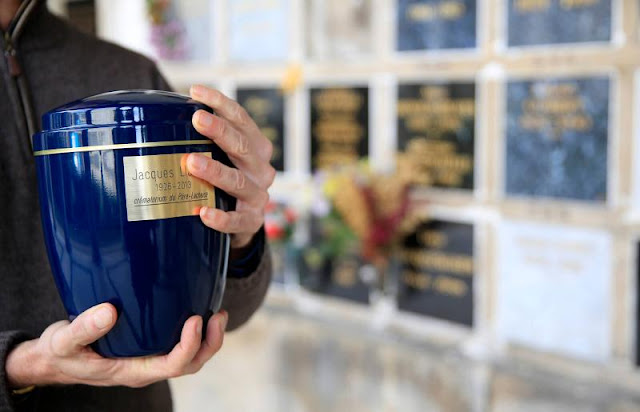What are the Pros and Cons of Cremation?
Cremation
has several advantages over other types of body disposition:
It’s Less Expensive:
With no cemetery
plot, burial casket, embalming of the body, headstone or monument, cremation is
less expensive that ground burial. On
average, ground burial costs six times more than cremation. Best Cremation Care
is the cheapest form of human interment.
It Gives a Family More Time to Plan a Ceremony:
Cremation
allows families to take their time planning a ceremony, (as ashes won’t
decompose). With a ground burial of a
body, there is a greater urgency to have a funeral service, which can be very
stressful for the deceased’s family. If
family members and friends live in different cities and countries, and cannot
come together immediately to pay their last respects to the deceased person,
then cremation is a good option because it allows a memorial service or
celebration of life to be planned at a later date.
The Remains are Portable:
Urns holding
cremains (a person’s cremated remains) are far more portable than a casket
holding the body. This gives the
deceased’s family much more flexibility in where to hold the ceremony. The memorial service or celebration of life
can easily be in a different part of the country or overseas.
It’s Environmentally Friendly:
Some people believe
cremation to be an environmentally friendly option because it prevents cemeteries
from expanding and taking up more land.
Cremation also doesn’t use chemicals that are used in embalming a body,
which can leach into the soil over time.
It’s Psychologically Easier:
Some people,
particularly those with claustrophobia, have a deep-seated fear of being
buried. Cremation is a good alternative
to a traditional ground burial.
It Gives Many More Memorial Options:
With cremation,
families have a wide range of Ways
To Memorialize A Loved One After
Cremation. A few examples include: burying
the ashes in a family cemetery plot; storing the ashes in a columbaria;
scattering the ashes in an outdoor location; scattering the ashes under a
memorial tree; or wearing cremation jewelry filled a small amount of ashes.
The Deceased’s Resting Place Can be a Sentimental Location:
With cremation, you aren’t restricted to using a
cemetery for the deceased’s final resting place. You and your family can scatter the ashes in
a place (or in several places) that had special meaning to the person that
passed away.
Cremation
also comes with several downsides, which you should also be aware of:
Cremations
aren’t Available Everywhere: Not every
community has a funeral home with the proper facilities and equipment to
perform cremations. In this event, you
may have to go to a funeral home in a neighbouring community.
Religious Bans:
Cremation is not permitted in some religious
faiths. As examples: Orthodox Judaism; Islam; and Greek Orthodox. Roman Catholicism historically forbade
cremation, but lifted the ban in the 1960s.
Since that time, cremation has been on the rise among Catholics. If you are religious and are unsure whether
or not cremation is an acceptable form of body disposition in your faith, check
with a spiritual leader.
Agreement Can Be More Difficult:
Some families
experience tension and strife when it comes to the subject of whether or not to
choose cremation, particularly where some members are more religious or
traditional than others. There may also
be disagreement over who will become the caretaker of the ashes and the
urn. Difficulty reaching consensus on
these issues can lead to long-term hard feelings between family members.
Environmental Concerns:
The process of cremation requires extensive
use of fossil fuels, which increases carbon dioxide emissions. The process also produces harmful mercury,
which is also released into the air.
Prevents Further Examination of the Cause of Death:
Even after
a body has been buried for years, it can be exhumed if investigation into the
cause of death is required. Cremation
prevents any further investigation from being conducted.
Impossible to Identify Misplaced Ashes:
There is always the
possibility that the cremains get misplaced.
In this event, it would be impossible for the deceased’s family to
identify the ashes of the deceased.
There would be nothing that the family could do to ensure the safe
return of their dearly departed loved one.
Lack of a Permanent Memorial:
One of the biggest
downsides of scattering ashes in an outdoor location is that there isn’t a
permanent memorial where family members and friends can visit in the
future. Some people find solace in being
able to visit and tend a graveside.
Scattering ashes on a family property may create emotional distress for
family members when the time comes to sell the property. Furthermore, the knowledge of where a family
member has been laid to rest is more likely to be forgotten by future generations
with scattering than with a ground burial.
(If this issue is a concern, the ashes can be buried in an urn at a
cemetery and have a grave marker.)





Comments
Post a Comment